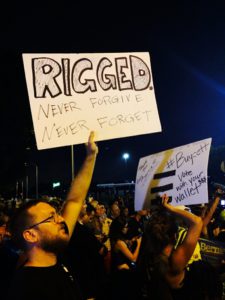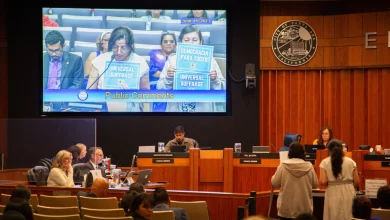
On Day three of the Democratic National Convention Liberation News spoke with Brian Ertz, a delegate and an attorney from the state of Idaho. Like many other first time delegates Ertz competed to become a delegate because he was “really inspired by Bernie Sanders, the political revolution, the energy, and the integrity.” That is, Ertz noted that all the issues of the Sanders campaign resonated with him, such as “income inequality, taking on Wall Street and the corporate capture of our democracy, and climate change.”
Ertz was also elected to serve as a standing member of the Rules Committee by the National Delegation for the Bernie Sanders campaign. The Rules Committee sets the procedural rules and adopts an agenda for the Convention. In addition, the members make amendments to the charter and bylaws of the Democratic Party, which go to the floor for ratification through deliberation and process. Explaining how this played out this year Ertz told Liberation News his story:
“We went in trying to take on superdelegates, closed primaries, caucuses, campaign finance reform, all of those issues that are integral to the political revolution. The Rules Committee sat on Saturday before the convention actually began and Barney Frank [former Congressman from Massachusetts-ed] chaired it. What I came to that Rules Committee expecting was a deliberative process for people from all over the country to contribute their ideas, to debate about the propriety of super delegate, to debate the need to open up the primaries and caucuses, and to engage in substantive democratic processes.
“What I found, quite frankly, was that Chairman Barney Frank was a tyrant. He created an atmosphere of intimidation around the microphone for committee members. He summarily shamed people off of the microphone who were bringing their genuine, organic ideas from all over the country. We proposed four or five super delegate amendments and open primary amendments. They were each shut down.
“All the Hillary people were obviously against the amendments. There were over 50 amendments brought to the committee, all from Bernie supporters. The Hillary Clinton campaign brought zero proposed amendments to the charter. The Hillary people had “whips” [floor leaders-ed] that were just to the periphery of the cameras who would give a thumbs down and their delegates would vote in lock step. It was unbelievable. It was all political theater.
“After about the fifth amendment got shut down, we all got pulled into a back room where Jeff Weaver [Sanders’ campaign manager], Ben Jealous [former national head of NAACP and prominent Sanders endorser who is now supporting Hillary Clinton-ed] and others pitched this Unity Commission, which is an advisory commission that deals with a lot of the issues. It is basically an advisory commission to the DNC. The Commission is charged with recommending that superdelegates relinquish their own power. That, to me, was unacceptable. I would say that the insiders, for whatever reason, had hashed this out and prepared it at least a week prior. They placed it on the agenda and basically said this is what we want you to vote for.
“Me personally, as a member from Idaho, was looking for a substantive democratic process. Instead, what we got was an insider deal between both campaigns. Putting on a theater they presented us with a quote unquote Unity Commission, that, as an attorney, I know means nothing. It is not enforceable. It is not gaining ground.
“All of the sudden then, all of the Hillary delegates were supporting this Unity Commission, who, prior to, had been shutting down the superdelegate amendments on auspices that ‘this was the wrong forum,’ and that ‘we’re not competent enough to take on this issue.’ Mind you, the rules committee is the explicit forum for these rule changes to the Democratic Party.
“Then, all of the sudden the Unity Commission was printed and the Bernie campaign pitched it to us under the auspice of ‘as a result of your deliberative debate, we’ve come to this compromise,’ but it was printed on DNC letterhead. It had been printed days before. There was zero chance that that was the result of that deliberative process.
“So we walk in and all the same Party luminaries that had previously been against the superdelegate amendments for being the wrong forum, were championing the Unity Commission. They made brief mention of it. Then they went into speeches of how we have to unify to take on Trump, and all of the same talking points we are hearing coming out of the convention. They desperately wanted it to be a unanimous vote, but I could not do it. I was one of six members of the Rules Committee that voted against it. The way their rhetoric was constructed around the need and the imperative for unity led to many delegates getting swept up in it. I wanted real progress. I don’t want another insider, closed-door process deciding the future integrity of the Democratic Party.
“Again, there were several opportunities to create rule changes to introduce opportunity for minority reports into the convention as a whole. My job and my first priority was to create procedural avenues for the delegation, of which Bernie Sanders delegates were 46 percent, to allow them to engage substantively in democratic debate on the convention floor and those were destroyed. They were shut down absolutely. They cinched off every opportunity for authentic democratic debate. Over the past few days what you have seen is the result of that process: theater, prepared speeches, censored microphones where they shut off the reaction from the crowd.
Reality vs. what is projected in media
“If you are in the hall or on the floor, it sounds a lot different than what is being projected on CNN. There is no unity on the convention floor. There is zero, and they have been making no effort to create it. They are just projecting it artificially into the outside world, and it is just really surreal to be a part of watching that happen. I will be in the hall, and literally, watching what goes up on CNN and it looks crisp, it looks smooth, but when you listen to what is actually happening on the floor, it is chanting, it is rich expression, it is Sanders delegates using the only avenue they have, which is protest. The only avenue Bernie Sanders delegates had to have any democratic input in that convention was protest. But Party officials don’t care because they know they control the media, at least the mainstream media, and their narrative, their talking point, is unity, and it’s a false narrative. Even Bernie Sanders, with his own delegates, who he had a closed meeting with on Saturday calling for unity, got booed off the stage. Booed off by his own delegates. This people power has been very uplifting and inspirational.”
Ertz’s account shows how the DNC actively worked to suppress internal democratic expression within the convention, and also how in collusion with capitalist media tried to keep the the national spotlight away from the principled protest of the Sanders’ delegates on the convention floor. What the events in Philadelphia show is that a substantial portion of Sanders’ supporters have, through their own experiences, come to understand the true nature of the Democratic Party as a representative of the 1 percent. Regardless of how Sanders supporter vote in November, this movement will continue to struggle in the streets and via electoral avenues to pursue their vision of a more just and peaceful future.





